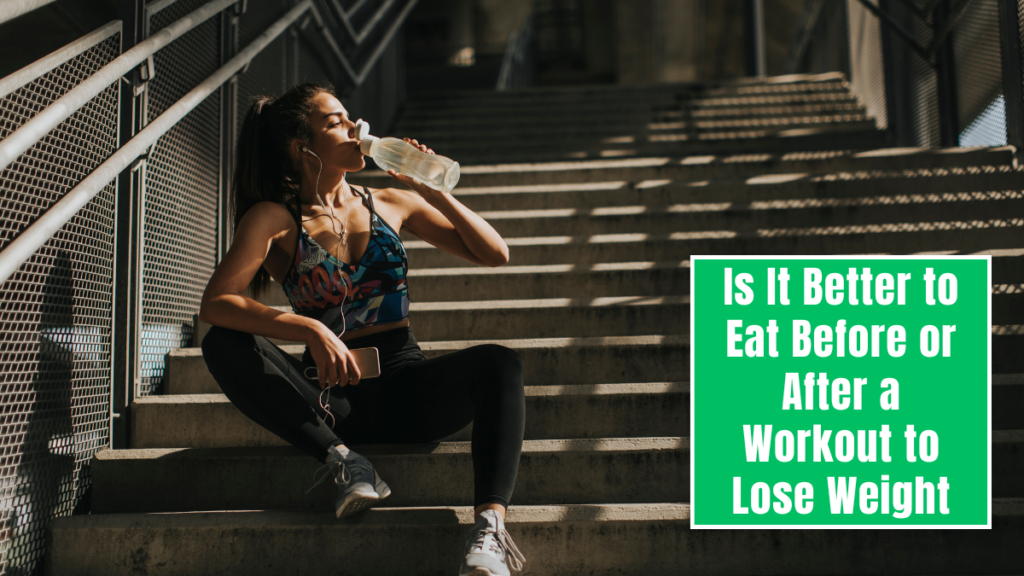When it comes to losing weight, the timing of your meals around your workout can be just as important as what you eat. Whether you should eat before or after your workout is a common question, and the answer can vary depending on your goals, the type of exercise you’re doing, and your metabolism. This blog post will explore the benefits and drawbacks of eating before versus after a workout and how each option affects weight loss.
Key Factors in Deciding Whether to Eat Before or After a Workout
| Item | Details |
|---|---|
| Metabolic Rate | Factors like age, muscle mass, and activity level influence the rate at which your body burns calories. |
| Energy Levels | The amount of physical and mental energy available is affected by nutrition, sleep, and overall health. |
| Fat Burning Potential | The body can oxidize fat for energy, often influenced by workout type, diet, and metabolic rate. |
| Muscle Preservation | The ability to maintain muscle mass during fat loss, influenced by protein intake and resistance training. |
| Workout Intensity | The level of effort and exertion during physical activity, impacting fat burning and muscle gain. |
| Digestion and Comfort | How well your body processes and absorbs food, impacting overall comfort and energy levels. |
| Nutrient Timing | The strategic timing of nutrient intake to maximize workout performance, recovery, and fat loss. |
Metabolic Rate
Your metabolic rate is how your body burns calories for energy. Eating before a workout can boost your metabolism, as your body will use the energy from food to fuel your exercise. This can be particularly beneficial if you’re engaging in high-intensity workouts that require immediate energy. However, if you’re focusing on losing weight, fasted workouts (exercising on an empty stomach) might help you tap into fat stores more effectively, as your body will have less immediate energy available from food.
Energy Levels
Energy levels are crucial for the quality and effectiveness of your workout. Eating before exercising can provide you with the necessary fuel to maintain high energy levels throughout your workout. This is particularly important for endurance activities like running or cycling, where sustained energy is needed. On the other hand, some people find that eating before a workout makes them feel sluggish or uncomfortable, especially if the meal is heavy or consumed too close to exercise time.
Fat Burning Potential
One of the main goals of exercising for weight loss is to burn fat. When you eat before a workout, your body primarily uses the carbohydrates from your meal as fuel. In contrast, if you exercise in a fasted state, your body is more likely to use stored fat for energy. This can potentially enhance fat loss, especially during low to moderate-intensity workouts. However, it’s essential to balance this with maintaining muscle mass and avoiding muscle breakdown.
Muscle Preservation
Muscle preservation is vital when losing weight, as maintaining muscle mass helps keep your metabolism high. Eating after a workout is crucial for muscle recovery and growth, especially if your workout includes resistance training or high-intensity interval training (HIIT). Consuming protein after your workout gives your muscles the amino acids they need to repair and grow, essential for maintaining muscle mass while losing fat.
Workout Intensity
The intensity of your workout can influence whether eating before or after exercising is better. High-intensity workouts typically require more immediate energy, which can be provided by eating beforehand. However, if your workout is of lower intensity, such as walking or yoga, you might not need to eat before exercising, and working out in a fasted state could promote fat burning.
Digestion and Comfort
Digestion and comfort significantly affect how you feel during your workout. Eating a large meal right before exercising can lead to discomfort, bloating, or even nausea, negatively impacting your performance. It’s generally recommended to allow at least 1 to 2 hours after eating before engaging in intense physical activity. If you eat before a workout, a small, easily digestible snack may be preferable.
Nutrient Timing
Nutrient timing refers to when you consume specific nutrients in relation to your workout. Eating a balanced meal with protein and carbohydrates after a workout can enhance muscle recovery and replenish glycogen stores, which are depleted during exercise. This post-workout meal is especially important if you exercise at a high intensity or for extended periods, as it helps to restore energy levels and promote muscle repair.
FAQs
Is it okay to work out on an empty stomach?
Working out on an empty stomach, or fasted cardio, can be effective for fat loss as it encourages your body to use stored fat as fuel. However, it may not be suitable for everyone, especially if you’re doing high-intensity exercise, as it can lead to fatigue or dizziness. It’s important to listen to your body and adjust your approach based on how you feel during your workout.
What should I eat before a workout to lose weight?
If you choose to eat before a workout, opt for a small, balanced snack that includes carbohydrates and protein. Examples include a banana with a small handful of nuts, a piece of whole-grain toast with peanut butter, or a smoothie with fruit and protein powder. These options provide energy without weighing you down.
How soon after a workout should I eat?
It’s generally recommended to eat within 30 minutes to 2 hours after a workout. This window is known as the “anabolic window,” during which your body is most efficient at using nutrients for recovery and muscle repair. A balanced meal with protein and carbohydrates is ideal for replenishing energy stores and promoting muscle recovery.
Does eating after a workout help with weight loss?
Yes, eating after a workout can help with weight loss by aiding in muscle recovery and preventing muscle breakdown. Consuming protein after exercise supports muscle repair, while carbohydrates help replenish glycogen stores, which can enhance your overall workout performance and long-term weight loss efforts.
Should I avoid eating after an evening workout?
You don’t need to avoid eating after an evening workout, but it’s essential to choose a light, balanced meal that won’t interfere with your sleep. Avoid heavy, high-fat, or high-sugar foods that can disrupt digestion and sleep quality. Opt for a light protein-rich snack, like Greek yogurt with berries or a small portion of lean protein with vegetables.
References
- National Institutes of Health (NIH) – Nutritional Timing and Exercise
- Centers for Disease Control and Prevention (CDC) – Physical Activity and Nutrition
- U.S. Department of Agriculture (USDA) – Nutrition and Fitness
- Office of Disease Prevention and Health Promotion (ODPHP) – Exercise Guidelines
- American College of Sports Medicine (ACSM) – Nutrition and Exercise



